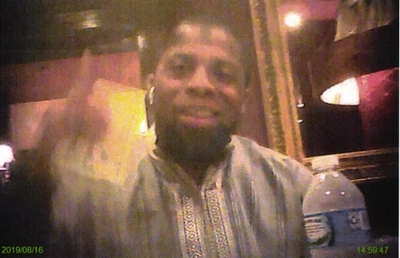 Jason Brown, aka, Abdul Ja'Me |
Brown, also known as Abdul Ja'Me, was the leader of a violent street gang in the Chicago area known as AHK.
Brown converted to a radical form of Islam while an inmate in Georgia serving time from 2016-18 for a gun violation. He was on supervised release at the time of his arrest. Brown was influenced by sermons from radical, Jamaican-based Islamic cleric Sheikh Abdullah Faisal, according to the criminal complaint filed by FBI Special Agent Nathan Scherer.
Faisal was convicted in the United Kingdom in 2003 of soliciting murder for encouraging Muslims to fight and kill "kuffars," or non-believers.
The U.S. Treasury Department named Faisal as a Specially Designated Global Terrorist in 2017 for recruiting for ISIS. Months earlier, Faisal, also known as Trevor Forest, had been indicted by a grand jury in New York state court for recruiting people to commit terrorist acts. Manhattan District Attorney Cyrus Vance, Jr. described Faisal as someone who "has dedicated his life to terror recruitment."
Faisal is currently in custody in Jamaica awaiting extradition to the United States to face those charges.
Jason Brown was one those who heeded Faisal's call to jihadi recruitment, the complaint said. Brown was also an ardent admirer of American-born al-Qaida cleric Anwar al Awaki, calling him his sheikh.
Brown demanded that all the members of the AHK gang convert to Islam. He shared ISIS videos with them and encouraged the gang members to engage in jihad. He talked of going to Syria to fight alongside ISIS members.
Many of the AHK crew had criminal records, including drug dealing and firearms violations. The pre-disposition to violence and animosity toward authorities have been found to be contributing factors in the radicalization process.
Even the name chosen for the gang was significant, Scherer stated in the complaint affidavit. It "appears to be an alternate spelling of the Arabic word akh, which means brother."
Brown wanted his crew to be a radical Muslim brotherhood (Akhwan/Ikhwan).
We have seen similar terminology in the UK prison system's research into Muslim gangs operating there.
It remains to be seen whether there were radical literature or videos Brown may have had access to while in prison for two years. Prison radicalization does not occur in a vacuum. Authorities have known for some time that the presence of radical literature and un-vetted clergy is just one of the catalysts that promotes radicalization among a vulnerable group ripe for terrorist recruitment. Prosecutors handling Brown's prosecution should also examine his time in state prison for additional indicators of radicalization.
The Brown case demonstrates the long tentacles of terrorist recruitment. International groups like ISIS and al-Qaida, along with charismatic clergy such as Abdullah Faisal, promoting a global jihadist ideology can reach into prisons and inner city gangs to recruit members. They have hijacked the environmentally-responsible slogan of "think globally, act locally."
The path from low-level criminal to incarceration to radicalization, to terrorism is recurring. The nexus between terrorism and organized crime (gangs) is also indisputable.
We witnessed it in 2015 during the Paris terror attacks, it occurred again in 2016 in Belgium, in Barcelona in 2017, and in the UK, as well as in numerous other countries around the globe.
Thankfully here in the U.S., through the excellent work of the FBI and local law enforcement, we have been able to stop potential attacks before they happen.
And while the UN announcement for the forum addressing the threat of prison radicalization contained a list of topics to be discussed such as, recidivism, rehabilitation, reintegration, gender-sensitive strategies, and a statement acknowledging that prisons, "can serve as potential incubators for radicalization..." is a step in the right direction, there still remains no clear consensus as to how to effectively combat it.
Discussing those topics without a focus on the need for stringent supervised release conditions, which the UN initiative never mentions, is pointless.
Until there is, we will continue to see cases like Jason Brown and the AHK.
IPT Senior Fellow Patrick Dunleavy is the former Deputy Inspector General for New York State Department of Corrections and author of The Fertile Soil of Jihad. He currently lectures a class on terrorism for the United States Air Force's Special Operations School.

